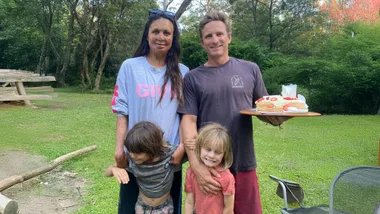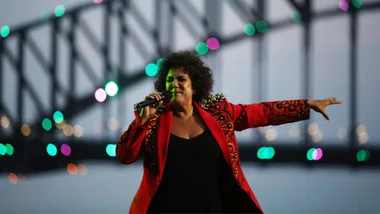CONTENT WARNING: This article discusses mental health, depression, and suicide.
Former tennis superstar Jelena Dokic has shared an emotional insight into her mental health journey.
The 40-year-old has been candid about her mental health and her struggles with depression and suicidal thoughts in the past, frequently encouraging her followers to be part of destigmatising discussions surrounding mental health.

The former world Number Four star is has shared an important insight into her mental health journey.
(Image: Instagram)On Tuesday night, Dokic shared a tearful photo to Instagram, telling her followers “This is from one of those ‘bad days’ we all have sometimes, but I thought it was important to talk about it in the hope that it might help someone out there who might be going through a tough time.”
“Know that it’s ok to say that you are not ok and to let it all out and cry. Openly. This for me was one of those days. I got overwhelmed and sad. I cried a lot and that’s ok. I let it all out,” she continued.
Dokic further urged her followers to be candid in their discussions about mental health, encouraging them to never “be ashamed or embarrassed to share your story and speak up. It’s your healing and for that you should never apologise.”

“Never be embarrassed to struggle. There is absolutely no shame in healing from your trauma.”
(Image: Instagram)Dokic previously shared a mental health update to Instagram in early May, with the caption of the post reflecting on her mental journey in the year since she contemplated taking her own life.
“Exactly a year ago on the left. 28.04. I will never forget it, for wanting to end my life. What a difference a year makes,” Dokic wrote.
“It’s exactly a year since that tough moment. I look at the picture on the left and I remember how scared and shattered I was. But I have survived. One step at a time, one hour at a time, one day at a time,” she continued.

“I look at the picture on the left and I remember how scared and shattered I was. But I have survived.”
(Image: Instagram)Dokic also shared the importance of having a support network when facing mental health challenges, telling her followers that “I wouldn’t be here if I didn’t get professional help and if I didn’t share it with you all, as well as a few close people in my inner circle. I can really say that it saved my life and it helped me survive, heal, and now thrive.”
According to Beyond Blue, one in seven people in Australia are affected by depression, with one of the most important factors for recovery being a strong network of support from not only from mental health professionals, but also friends, family, and peer support groups.
“Sharing and telling people what is going on was instrumental in not feeling alone. Seeing a psychiatrist rebuilt me. Telling my closest friends and not being shamed saved my life. The amazing community that I have here on Instagram helped get me through some tough days. I have never felt so much understanding, love, care, and kindness,” Dokic shared.

Dokic has continued to encourage her follows to destigmatise conversations regarding mental health.
(Image: Getty)Dokic’s vulnerability and honesty in sharing her struggles with mental health continues to play a critically important role in destigmatising conversations surrounding mental health; letting others know that it’s okay to not be okay, and that someone is always there for them.
“We know that creating mental health and suicide-safe communities where people can be open about their struggles without shame and getting the right help can save lives. So we need to break down the stigma around mental health and normalise the conversation because it saves lives,” she added.
If you or someone you know has been affected by any of the issues raised in this article, help is always available. Call Lifeline on 13 11 14.
.png?fit=900%2C553)









